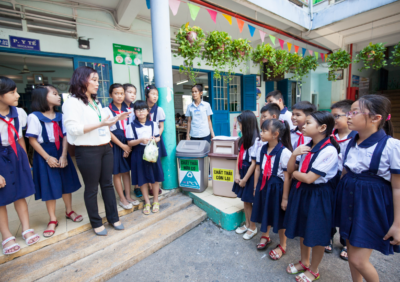Vietnam has experienced rapid urbanization, especially in the last decade, with urban populations expected to surpass those in rural areas by 2050. Despite relatively high waste collection rates in urban centers, over one quarter of urban residents live in low-income and densely populated areas where collection can be challenging to deliver consistently. Vietnam’s urban growth, combined with increased demand for and dependency on single-use plastics, has outpaced its waste system capacities, leading to environmental leakage. USAID’s Clean Cities, Blue Ocean (CCBO) program is piloting solutions to address these challenges, which also impact human health and our climate.
In 2019, Vietnam issued its National Action Plan on Marine Plastic Debris Management until 2030, which aims to reduce plastic litter in oceans by 50% by 2025 and by 75% by 2030. Clean Cities, Blue Ocean is supporting these goals through targeted national-level support and activities in four engagement sites.
Engagement Sites
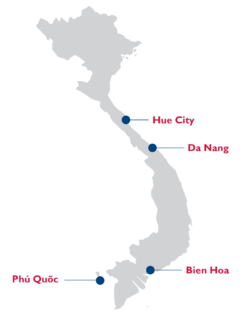
- Phú Quõc is Vietnam’s largest island, with a population of just over 100,000 thousand and a burgeoning tourism sector. On the island, USAID is working with partners to develop and pilot a community-based waste management model, focusing on households and hotels, and integrate waste management into the island’s annual socioeconomic development plans.
- Hue City has deep historical significance and a large tourism economy. The program is working with local partners to develop the city’s circular economy by launching a “ReForm” plastic facility—a new market-based recycling scheme and social enterprise model focused on low-cost solutions for processing plastic and packaging waste into new materials. Behavior change for increased sorting and waste collection is promoted amongst households and businesses to support the success and sustainability of the system, and local government and municipal waste operators are engaged to ensure a strong enabling environment.
- Da Nang is aggressively working to become greener and more sustainable by reducing the over 1,000 metric tons of waste it generates each day. The program is supporting the effort by developing public-private partnerships and engaging with informal waste collectors to build their capacity, support their formalization as a professional group, and align their services with increasing waste demands.
- Bien Hoa, located near the Mekong River Delta, is a rapidly growing industrial and commercial area. Here, Clean Cities, Blue Ocean is working to establish and build the capacity of informal waste collector cooperatives to formalize their role in waste management, increase their collection volumes and earnings, and improve worker safety and protections.
Impacts and Results
In Vietnam, program impacts (to date) include:
- Safely managed and prevented nearly 4,000 metric tons of waste (including nearly 1,000 metric tons of plastic) from entering into drainage canals, rivers, streams—and ultimately the ocean.
- Improved solid waste systems and services for over 1.1 million households (approximately 3.8 million people) through support to and partnerships with government entities, local organizations, and businesses.
- Trained over 1,700 individuals from local government, the informal waste sector, and local organizations to build local capacity for solid waste management planning and programs.
- Formed more than 30 partnerships with local and national government entities to advance sustainable circular economies.
- Awarded approximately $1.4 million in grant funding to support local organizations and city governments to implement effective, locally-led solutions.
Program Grantees
- Asian Society for Social Improvement and Sustainable Transformation (ASSIST) is creating an innovative public-private partnership scheme that integrates informal waste collectors into municipal waste operations at selected community material recovery facilities, transfer stations, or at the landfill. ASSIST seeks to simultaneously boost demand for recyclable plastics by engaging end markets (national and international recyclers), creating a trading platform, and supporting informal waste collectors to increase collection of separated and cleaned material that meets demand standards (enough volume to create an economy of scale and material that is clean and separated into the desired materials).
- Center for Environment and Community Asset Development (CECAD) is implementing a two-phased grant, with the first phase focused on research, establishing partnerships, understanding the value-chain, leverage points for integrating into local SEDP and developing a community-led solid waste management system design to be tested in its second phase. CECAD’s grant focuses on the recovery of high- and low-value plastics as well as organic materials, which make up a significant portion of the waste stream.
- Environment and Development in Action (Enda Vietnam) is establishing and building the capacity of informal waste collector cooperatives to formalize their role in waste management, increase their collection volumes and earnings, and improve safety conditions through the provision of appropriate protective gear.
- Ham Long Research and Support Center for Social Work (HLC) is addressing the mounting issue of poor waste management in Hue city by piloting an improved and localized SWM system in two wards to better sustain community behavior change by strengthening internal resources, environmental practices, and local capacity. HLC is also strengthening networking within government, high-profile experts, the private sector, informal and formal waste collectors, and members of women and youth unions.
- From July 2022 to November 2023, Green Joy supported Phu Quoc in its transition away from single-use plastics using a multipronged approach, based on research on solutions fit for Phu Quoc’s local context. Green Joy has developed and produces bio-degradable and/or eco-friendly products, including grass bags, straws, and other handicrafts made of grass. Through the grant, Green Joy established a Hub to sell and distribute the goods to other retailers on the island, raised awareness and educating residents and tourists on the positive benefits of using bio-degradable and/or eco-friendly products, and improved the livelihoods of Phu Quoc residents by creating jobs to manufacture the products.
Insights & Updates
See All Insights & Updates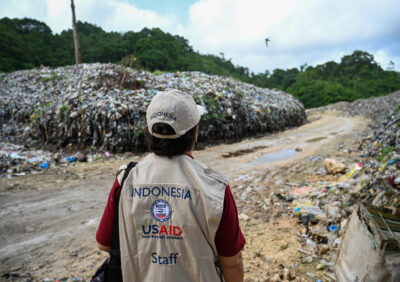
Preventing More Than One Million Tons of Plastic from Entering the Environment
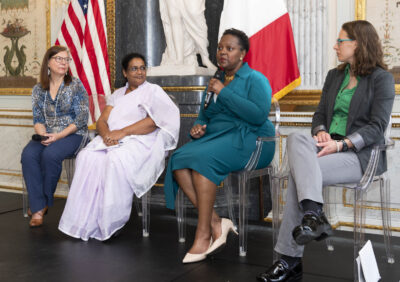
USAID Calls for Collective Action at Local and National Levels to Reduce Plastic Pollution
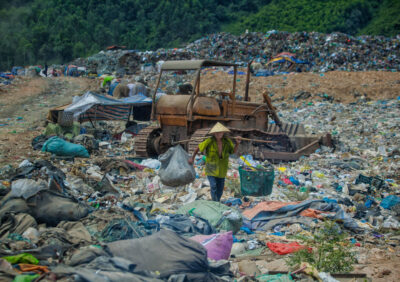
USAID Announces New Vietnam Partnership to Address Ocean Plastic Pollution
